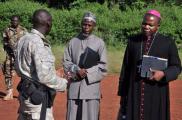
Reports about the violence committed against Muslims in the Central African Republic (CAR) have shocked Muslims everywhere. These heinous crimes and images of dead bodies are being exploited to add fuel to the fires of civil strife in the wider region. They are being used to mobilise angry people, threatening to expand the theatre of war. A sober reading of the events is urgently needed to calm people and avoid communal tensions.
Of CAR’s population of more than 4.5 million, around 50 per cent are Christian, 25 per cent hold indigenous beliefs and the remainder 25 per cent are Muslim.
An armed alliance of militias called “Seleka” was formed, mainly of younger Muslims who hold extreme views towards the majority Christian population. In retaliation, an armed militia called “Anti-Balaka” was formed, consisting of younger Christians who hold similarly hostile and extreme views towards the Muslim minority.
Seleka came to power by seizing the capital and effectively deposing the Christian president, Francois Bozize, who himself assumed power by overthrowing the president before him. As Mr Bozize began to sense the threat being posed to his seat of power by the Muslim Seleka rebels, he began inciting the Christian Anti-Balaka militias against Muslims and calling for their killing, falsely claiming that the Seleka were immigrant Arabs who wanted to destroy churches and rule the country.
Seleka removed Mr Bozize only after the French withdrew their support for him after his regime’s financial corruption was exposed, in particular that Mr Bozize gave Chinese companies concessions for oil exploration and opened it up for competition, thus inflaming the anger of the French.
Mohammad Michel Djotodia, Seleka’s leader, assumed power and dissolved the group. But he was unable to rein it in. Many ordinary young Muslims joined Seleka and began hostilities against Christians and churches. They would arrogantly boast about their rule over the country and how they will turn it into a Muslim country, despite their scant devotion to the dictates of Sharia. They operated as gangs.
Local Muslim scholars strongly rejected Seleka’s hostilities towards Christians. Imam Omar Kobine Layama, president of the Central African Muslim community, stood firmly against their criminal activities. Seleka’s leadership threatened Imam Omar and he was exposed to harm but he continued to insist that Christians and their churches be protected. He joined together with the Archbishop of Bangui, Dieudonne Nzapalainga, to call for peace. They went on a tour of European countries to address politicians on the necessity of bringing stability to the country and preventing the armament of the Muslim and Christian militias.
Some members of the community responded to Imam Omar’s call and 30 of them stood to protect the Catholic church in their neighbourhood in the north of Bangui. They would face up to the armed Seleka militiamen and attempt to convince them that the Islam they claim to follow does not authorise them to attack churches. But they were not strong enough to respond to a group feeling victorious and powerful.
Likewise, hordes of Christians joined Anti-Balaka. Confrontations between the two militias intensified. Fighting between armed groups quickly extended to the killing of unarmed citizens, including women and children.
French troops intervened and tried to disarm the militias. It has been reported that there were some inconsistencies in their approach, tipping the balance in favour of Anti-Balaka, and leading to an increase in the killing of Muslims. The Muslim president resigned and a Christian interim president, Catherine Samba-Panza, was sworn in. She announced her determination to stop the killings and asked the world to support her fight against the crimes being committed against Muslims.